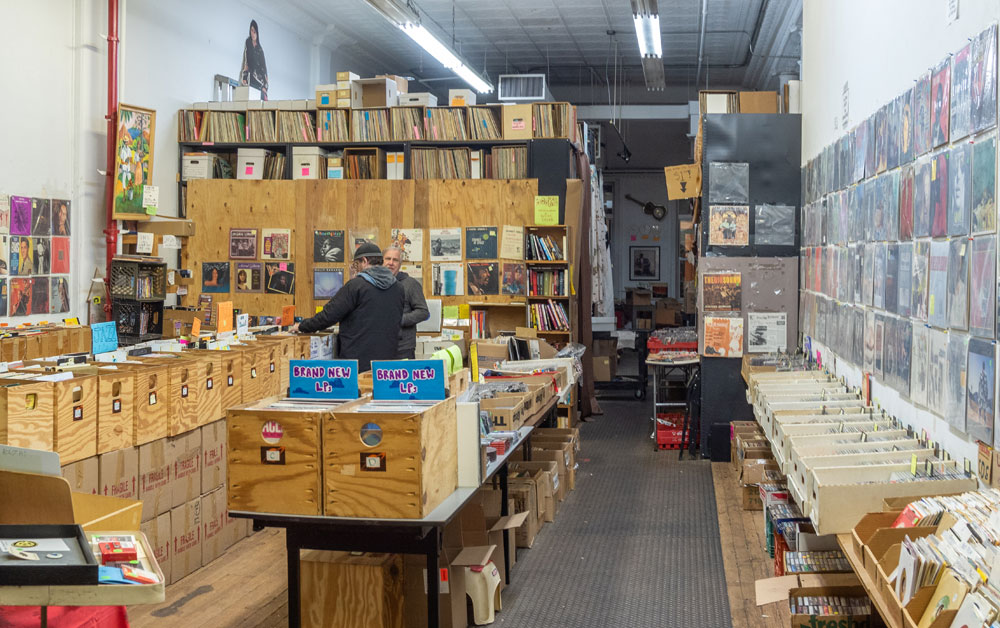
January 3, 2020, New York Times
High rent due to gentrification, difficulties raising money to cover overhead, succession planning for a 70-year-old founder…the Archive of Contemporary Music in New York’s Tribeca faces a number of issues other nonprofits would find familiar.
The Tribeca neighborhood on Manhattan’s lower west side was originally an industrial area. Just fifty years ago, it had little residential space, but now it’s the most desirable place to live in all of New York City. In addition to cobblestone streets and wealthy residents in converted lofts, it is also the home of three million recordings in vinyl and on CD in the form of the Archive of Contemporary Music. Or, at least it has been up to now. The high rent has caught up to the music.
The Archive holds as many sound recordings as the Library of Congress, along with memorabilia, music books, almost 1,800 signed albums, and press kits. The Archive continues to receive almost a quarter of a million donated recordings annually. Rolling Stones guitarist Keith Richards, a member of the board of advisors, keeps a majority of his blues collection there. It employs three employees and hires regular interns.
The nonprofit has been fortunate, managing to stay financially stable every year until the last three.
“We were running $100,000 in debt,” said Bob George, founder and director. “I’ve never been in debt over these 35 years, but over these last three years, it’s just become overwhelming.”
George has until June to move, after negotiating an early out to his lease.
Sign up for our free newsletters
Subscribe to NPQ's newsletters to have our top stories delivered directly to your inbox.
By signing up, you agree to our privacy policy and terms of use, and to receive messages from NPQ and our partners.
George relocated to New York City in 1974 as a visual arts student who earned money as a DJ. He started the Archive with 47,000 albums that he collected from the DJ work and clubs in the city that closed. Periodically, he produced a survey of American experimental and pop music for The John Peel Show on the BBC. George also published a music reference book, Volume: The International Discography of the New Wave.
George’s recent actions demonstrate an awareness of challenges that won’t go away and a caution that points toward facing these issues sooner rather than later. The debt was paid off through donations, board members’ generosity, sales of surplus merchandise in its inventory, and fees charged for research services, but George knew that the rent issue was not going to improve if the Archive stayed in Tribeca.
Still, the Archive serves a peculiar demographic— writers, researchers and filmmakers who pay to find obscure music recordings—so affordable space in New York City is the goal. George says it will be difficult to find a new home in the city without support from key institutions like New York’s Department of Cultural Affairs. New donors are needed, too, as attrition and donor fatigue have taken their toll. Past donors and board members include notables like Lou Reed, Paul Simon, David Bowie, and even Martin Scorsese.
The alternative to a new home is putting the works in storage, but it is critical that the trove of music remains accessible—as an income producer, at the very least. The chief executive of Atlantic Records, Craig Kallman, is a trustee of the Archive and, considering the change to streaming music on the internet, feels the Archive will become more dominant.
“There’s something interesting about this want for preservation of any medium that has gone through this transformation in a digital age,” Kallman says. “So I think it’s only slowly seeping into consciousness as people begin to appreciate the original, or the return to vintage things.”
Kallman also believes more people and entities will want to access vinyl recordings as master tapes deteriorate. A fire at Universal Studios that destroyed master tapes of Duke Ellington, Chuck Berry and just about all of Buddy Holly’s work validates the need for other methods to retain valuable music history.
Another nonprofit, the Internet Archive, is working with the Archive to digitize its recordings, but the objective is to preserve the originals. For the time being, there is an immediate need for approximately 20,000 boxes to move the Archive.—Marian Conway













